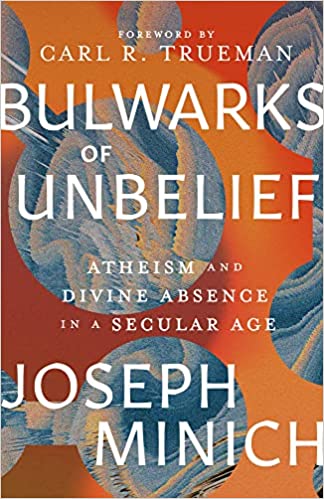Staff Review
Bulwarks of Unbelief: Atheism and Divine Absence in a Secular Age
(Lexham Press)

A small cottage industry has emerged orbiting around Charles Taylor’s magnum opus A Secular Age. These books praise A Secular Age for its enormous breadth and perceptive insights, only to follow this up with “But…”
A small cottage industry has emerged orbiting around Charles Taylor’s magnum opus A Secular Age. These books praise A Secular Age for its enormous breadth and perceptive insights, only to follow this up with “But…” Joseph Minich’s book is yet another to add to that genre. Bulwarks of Unbelief: Atheism and Divine Absence in a Secular Age is a dense, at times convoluted book that seeks to offer another viewpoint/perspective into how modern Western culture lost belief in God.
Minich proposes several novel explanations for how modern Western culture came to believe in the absence of God. He emphasizes the momentous shift that occurred due to our technological revolution, how we as God’s stewards of the earth have in fact been alienated from our labour, and how we are unmoored and unaware of our history in the Great Story of Christianity. The shift from rural living to urbanization also cut millions off from their traditional networks (here I want to agree with him as someone who wonders/ponders whether smaller communities can be more fertile grounds for “thick” Christian belief and practice and yet I also hear Tim Keller’s impassioned case for mission to the city as the hub of culture, politics, economics, etc…as well as reading the end of Revelation where our future home is a city, the New Jerusalem).
Minich laments how the modern West has become unmoored from its history. This is certainly true - as much for “secular” history as for religious. Many people today take for granted concepts such as inherent human dignity, rights, and care for the marginalized, without critically acknowledging that these convictions have their roots/genealogy in Christianity; modern Westerners hold to these values sheerly through “faith” but to believe them is so much of second nature that it no longer seems like a faith commitment.
I appreciate Minich’s focus on work (especially in relation to technoculture) as this is a new idea I have not seen widely considered. Still, I wonder how this actually plays out in practice. A factory worker on an industrial line and a therapist in a downtown office both use technology but the latter’s labour is inherently more relational; typing notes on a laptop is not the same as assembling an automobile. How does an industrial/manufacturing economy differ from the service economy that has been preeminent in the West for decades (p. 177)? I am surprised that Minich neglects to interact with the work of the late Albert Borgmann whose 2003 book Power Failure: Christianity in the Culture of Technology is one of the key texts in addressing the Christian faith’s relationship to technology.
Minich writes from a Protestant perspective, deeply influenced by the likes of Herman Bavinck, but I wonder how much of his analysis neglects Catholicism and pentecostalism in the modern West. Catholicism tends to be a more material form of Christianity than Protestantism (more smells and bells, rosaries, vestments, candles) and this material, this “stuff,” could be a more intentional and tangible reminder of God’s presence in the world as holy practices are mediated through material things. Charismatic and pentecostal Christianity continue to see the world as more enchanted than cessationist Protestants who believe that miracles have ceased (and indeed, much of Minich’s book fruitfully explores how much of the West’s “religion and the decline of magic” was linked to the development of the encroaching technoculture). For magisterial Protestants, communion tends to be the only regular practice involving material things (though one could argue that the Bible, as a physical book, is also a material means of mediation).
Overall, while there is likely truth to Minich’s proposals, they come across as vague gesturings rather than concrete explanations. Minich admits at the end of his book that it is more of a phenomenological intuition rather than hard, empirical research, stating, “While the object of my inquiry is mostly the world as phenomenologically manifest, much of my theoretical argument is grounded in intuition as specified in discourse and as ‘played with’ in order to see how it helps to illuminate our experience. The success of my argument, therefore, is to be measured less by its comprehensiveness than by whether its basic outline resonates with the intuitions of the reader as illuminating our common world” (p. 272).
In The Idiot Fyodor Dostoevsky writes “Don’t let us forget that the causes of human actions are usually immeasurably more complex and varied than our subsequent explanations of them.” Like Taylor’s A Secular Age, Minich’s book is a multiplex, at times labyrinthine, analysis of modern unbelief and the purported absence of God in the West. It is a useful addition to the ongoing conversation around disenchantment in the modern world but at times its cumbersome prose may intimidate or confuse average readers.
By
July 17, 2023


